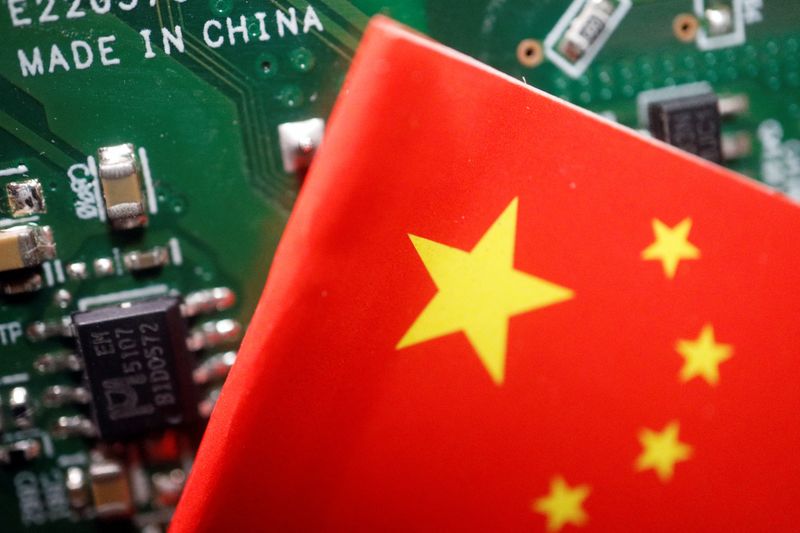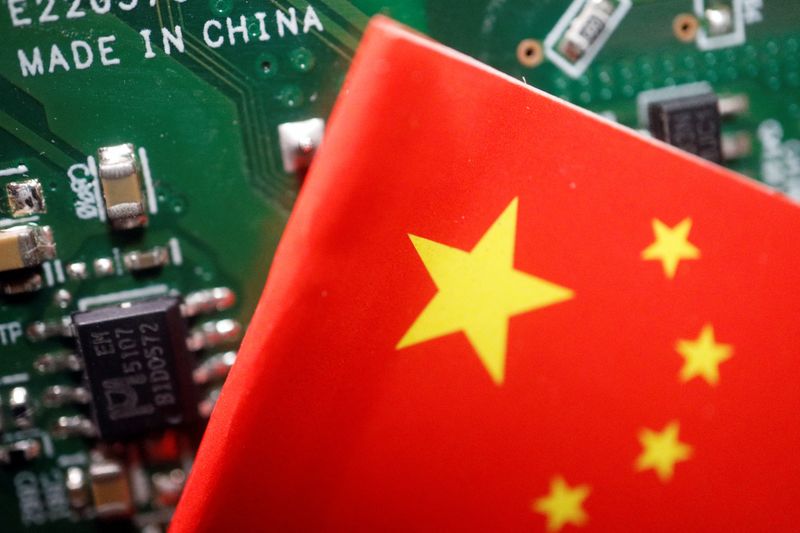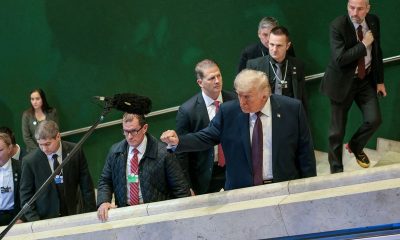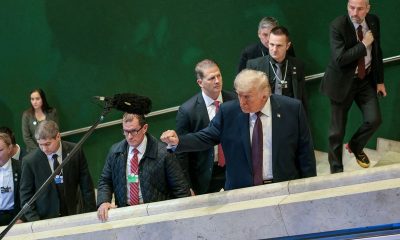Economy
What people are saying about China’s chipmaking export controls


© Reuters. A Chinese flag is displayed next to a “Made in China” sign seen on a printed circuit board with semiconductor chips, in this illustration picture taken February 17, 2023. REUTERS/Florence Lo/Illustration/File photo
(Reuters) -China will control exports of some metals used in the semiconductor industry, ramping up a technology war with the United States and potentially causing more disruption to global supply chains.
Here’s what people are saying about the measure:
LUCY CHEN, VICE PRESIDENT AT TAIPEI-BASED ISAIAH RESEARCH:
“We believe that gallium and germanium are indeed important raw materials for the semiconductor industry, and China currently accounts for at least 80% of their supply. The gallium and germanium export controls that China has recently implemented have a direct impact primarily on the field of compound semiconductors, such as GaAs substrate suppliers Sumitomo, Freiberger and AXT (NASDAQ:), as well as U.S. GaN substrate suppliers including Cree (NYSE:) and II-VI. This also has a knock-on effect on the production of related products such as radio frequency, power amplifier, LED and communication equipment.”
“Although the above-mentioned substrate suppliers rely on gallium imported from China as raw materials, there are other secondary suppliers in Japan, South Korea, Europe, America and other regions that can provide materials, which can control the risk of upstream material shortages. However, under China’s export controls, the cost of gallium and germanium may increase. Whether other suppliers can provide enough material to meet demand is also the focus of our continuing observation.”
JOHN STRAND OF STRAND CONSULT:
“Gallium and Germanium are not like the rare earths where there is almost no alternative suppliers. These are metals that can be gotten in other ways, by-product of coal mining. The effect of restriction would yes be an increase in price, but not at all as painful for the rest of the world as chip restrictions are for China.”
BEN WOOD, CMO OF INDUSTRY ANALYSIS FIRM CCS INSIGHT:
“There has been speculation for some time that China would respond to the escalating sanctions it has faced from the U.S. and others. This is a bold move that will take time to filter through the supply chain but there is little doubt raw materials play a key role across numerous sectors which could cause some disruption over time.”
KAZUMA KISHIKAWA, ECONOMIST AT DAIWA INSTITUTE OF RESEARCH:
“From what I’ve seen, they haven’t narrowed down the countries targeted by the export restrictions, but since Japan, the U.S., and the Netherlands will naturally be included, I think it’s fair to say that this is a de facto retaliatory measure.”
PETER ARKELL, CHAIRMAN OF GLOBAL MINING ASSOCIATION OF CHINA:
“It hardly comes as a surprise that China would respond to the American-led campaign to restrict China’s access to microchips. With roughly 90% of global production of these minor metals, China has hit the American trade restrictions where it hurts. It seems to be a pretty fundamental trade negotiation tactic.
“Gallium and germanium are just a couple of the minor metals that are so important for the range of tech products and China is the dominant producer of most of these metals. It is a fantasy to suggest that another country can replace China in the short or even medium term.”
STEWART RANDALL AT SHANGHAI-BASED CONSULTANCY INTRALINK:
“Chinese suppliers would lose customers, and in the short term it would cause supply issues if China did actually deny exports.
“To me it doesn’t seem as much of a chokepoint because there’s no difficult technological blocker. It is a logistical supply chain blocker of finding new raw materials suppliers.”
MANAGER AT A CHINA-BASED GERMANIUM PRODUCER, WHO DECLINED TO BE NAMED DUE TO THE SENSITIVITY OF THE MATTER:
“The number of enquiries from abroad surged overnight after the export control news. Many overseas buyers are asking, mainly from Europe, Japan and the United States, as it may take as long as two months to get licence permit for exports, so overseas buyers will need to stockpile more cargoes in advance to sustain production in at least two months.
“Offer prices in the domestic market and the export market have increased to 10,000 yuan ($1,380) per kg and over $1,500 per kg, respectively.”
Economy
Russian central bank says it needs months to make sure CPI falling before rate cuts -RBC


© Reuters. Russian Central Bank Governor Elvira Nabiullina attends a news conference in Moscow, Russia June 14, 2019. REUTERS/Shamil Zhumatov/File Photo
MOSCOW (Reuters) – Russia’s central bank will need two to three months to make sure that inflation is steadily declining before taking any decision on interest rate cuts, the bank’s governor Elvira Nabiullina told RBC media on Sunday.
The central bank raised its key interest rate by 100 basis points to 16% earlier in December, hiking for the fifth consecutive meeting in response to stubborn inflation, and suggested that its tightening cycle was nearly over.
Nabiullina said it was not yet clear when exactly the regulator would start cutting rates, however.
“We really need to make sure that inflation is steadily decreasing, that these are not one-off factors that can affect the rate of price growth in a particular month,” she said.
Nabiullina said the bank was taking into account a wide range of indicators but primarily those that “characterize the stability of inflation”.
“This will take two or three months or more – it depends on how much the wide range of indicators that characterize sustainable inflation declines,” she said.
The bank will next convene to set its benchmark rate on Feb. 16.
The governor also said the bank should have started monetary policy tightening earlier than in July, when it embarked on the rate-hiking cycle.
Economy
China identifies second set of projects in $140 billion spending plan


© Reuters. FILE PHOTO: Workers walk past an under-construction area with completed office towers in the background, in Shenzhen’s Qianhai new district, Guangdong province, China August 25, 2023. REUTERS/David Kirton/File Photo
SHANGHAI (Reuters) – China’s top planning body said on Saturday it had identified a second batch of public investment projects, including flood control and disaster relief programmes, under a bond issuance and investment plan announced in October to boost the economy.
With the latest tranche, China has now earmarked more than 800 billion yuan of its 1 trillion yuan ($140 billion) in additional government bond issuance in the fourth quarter, as it focuses on fiscal steps to shore up the flagging economy.
The National Development and Reform Commission (NDRC) said in a statement on Saturday it had identified 9,600 projects with planned investment of more than 560 billion yuan.
China’s economy, the world’s second largest, is struggling to regain its footing post-COVID-19 as policymakers grapple with tepid consumer demand, weak exports, falling foreign investment and a deepening real estate crisis.
The 1 trillion yuan in additional bond issuance will widen China’s 2023 budget deficit ratio to around 3.8 percent from 3 percent, the state-run Xinhua news agency has said.
“Construction of the projects will improve China’s flood control system, emergency response mechanism and disaster relief capabilities, and better protect people’s lives and property, so it is very significant,” the NDRC said.
The agency said it will coordinate with other government bodies to make sure that funds are allocated speedily for investment and that high standards of quality are maintained in project construction.
($1 = 7.1315 renminbi)
Economy
Russian central bank says it needs months to make sure CPI falling before rate cuts -RBC


© Reuters. Russian Central Bank Governor Elvira Nabiullina attends a news conference in Moscow, Russia June 14, 2019. REUTERS/Shamil Zhumatov/File Photo
MOSCOW (Reuters) – Russia’s central bank will need two to three months to make sure that inflation is steadily declining before taking any decision on interest rate cuts, the bank’s governor Elvira Nabiullina told RBC media on Sunday.
The central bank raised its key interest rate by 100 basis points to 16% earlier in December, hiking for the fifth consecutive meeting in response to stubborn inflation, and suggested that its tightening cycle was nearly over.
Nabiullina said it was not yet clear when exactly the regulator would start cutting rates, however.
“We really need to make sure that inflation is steadily decreasing, that these are not one-off factors that can affect the rate of price growth in a particular month,” she said.
Nabiullina said the bank was taking into account a wide range of indicators but primarily those that “characterize the stability of inflation”.
“This will take two or three months or more – it depends on how much the wide range of indicators that characterize sustainable inflation declines,” she said.
The bank will next convene to set its benchmark rate on Feb. 16.
The governor also said the bank should have started monetary policy tightening earlier than in July, when it embarked on the rate-hiking cycle.

 Forex4 years ago
Forex4 years agoForex Today: the dollar is gaining strength amid gloomy sentiment at the start of the Fed’s week

 Forex3 years ago
Forex3 years agoUnbiased review of Pocket Option broker

 Forex3 years ago
Forex3 years agoDollar to pound sterling exchange rate today: Pound plummeted to its lowest since 1985

 Forex3 years ago
Forex3 years agoHow is the Australian dollar doing today?

 Cryptocurrency4 years ago
Cryptocurrency4 years agoWhat happened in the crypto market – current events today

 World3 years ago
World3 years agoWhy are modern video games an art form?

 Commodities3 years ago
Commodities3 years agoCopper continues to fall in price on expectations of lower demand in China

 Economy3 years ago
Economy3 years agoCrude oil tankers double in price due to EU anti-Russian sanctions

























